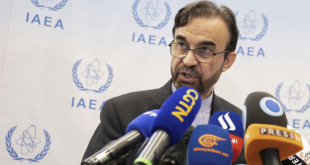 The head of the UN’s atomic energy agency, Mohamed ElBaradei, has welcomed Iran’s decision to allow inspections of its heavy water reactor at Arak. He said that after recent talks with IAEA experts, Iran had for the first time agreed to discuss concerns which remain over its nuclear programme.
The head of the UN’s atomic energy agency, Mohamed ElBaradei, has welcomed Iran’s decision to allow inspections of its heavy water reactor at Arak. He said that after recent talks with IAEA experts, Iran had for the first time agreed to discuss concerns which remain over its nuclear programme.
More talks are expected at the agency’s headquarters in Vienna this month.
Iran says its programme is civilian, but some western countries accuse it of seeking to develop nuclear weapons.
The UN Security Council has imposed two rounds of sanctions on Iran for refusing to halt its uranium enrichment activities and is now considering a third round.
“So we are seeing at least a positive move on the part of Iran, but I hope that we will continue on that road,” Mr ElBaradei said.
He called for patience but said Iran needed to continue efforts to assure the international community over its nuclear programme.
“We require a consistent effort by Iran to work with us and we also require the international community to understand that this is a complex process that will take some time,” he said.
Still defiant
At talks in Tehran last week, Iranian officials agreed to allow International Atomic Energy Agency inspectors into the Arak heavy water plant and agree safeguards at its Natanz uranium enrichment plant.
Analysts say a number of significant questions about Iran’s nuclear work could be cleared up if Iran holds to this deal.
However, Tehran is still enriching uranium in defiance of the UN Security Council – the key sticking point between the West and Iran and one not dealt with by the latest agreement.
Heavy water reactors produce plutonium, which can be used in nuclear weapons as an alternative to enriched uranium.
Located some 190km (120 miles) south-west of Tehran, the reactor has long been a bone of contention between Iran and the West.
Arak was one of two Iranian nuclear facilities, the existence of which was revealed by an exiled Iranian opposition group in 2002. At that stage Iran had failed to declare its existence to the IAEA.
Heavy water is used to moderate the nuclear fission chain reaction either in a certain type of reactor – albeit not the type that Iran is currently building – or produce plutonium for use in a nuclear bomb.
The project is scheduled to be completed by 2009.
 Eurasia Press & News
Eurasia Press & News


